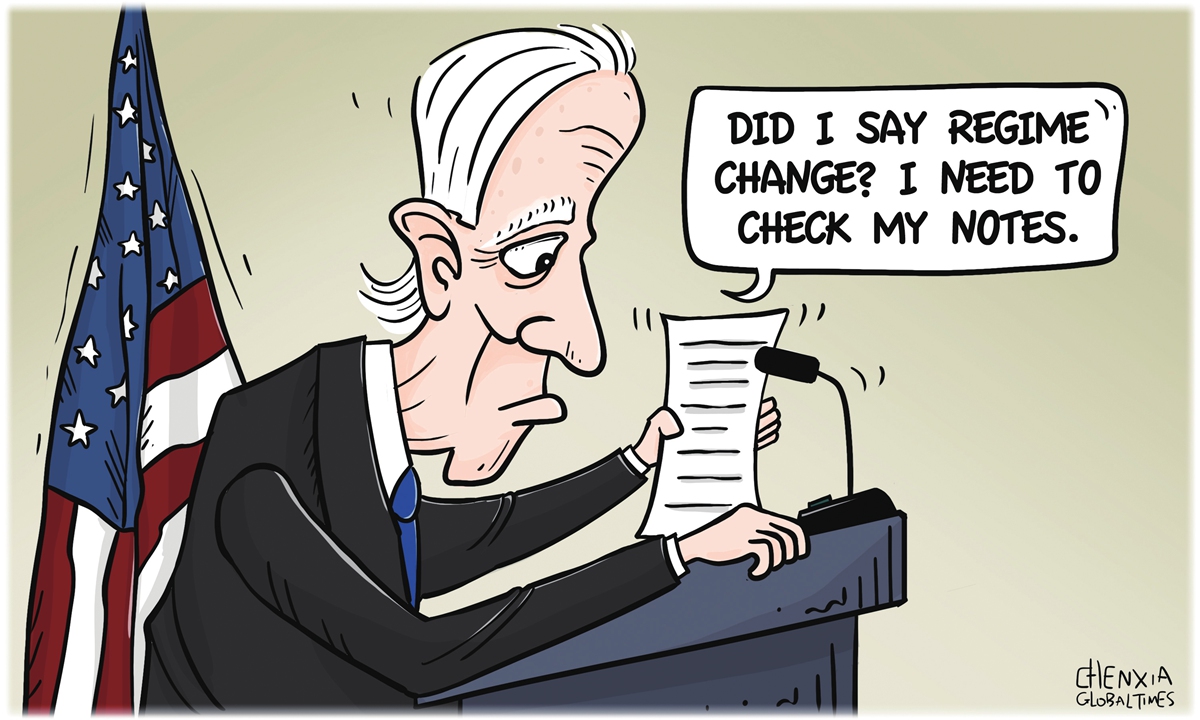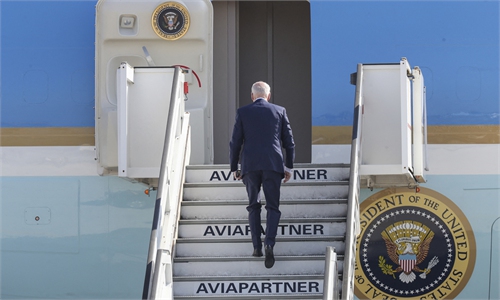Regime change is old, dangerous trick of US

Biden "regime change" Illustration: Chen Xia/GT
On March 26, Biden gave a lengthy speech on the last day of his visit to Poland. At the end of the speech, he suddenly said that Putin "can no longer stay in power."
The world was stunned. Is the White House going to officially declare war on Russia?
Two days later, Biden said at a press conference when he returned to the US that his previous statement was an "expression of anger" and did not mean that the US was going to change its policy toward Russia and conduct a "regime change" against Putin's government.
Over the years, "regime change" has become the main option for the US to maintain its hegemony. It seems the targets were countries with so-called dictatorships. Actually, they were those that opposed US interests, challenged US hegemony, or did not "follow" the US order.
Even though Biden said that Washington has no such consideration for Russia, it is precisely this angry discourse that exposes the deepest considerations of the US leadership.
In 2000, after the bombing of the former Yugoslavia by US-led NATO, in order to achieve "regime change," the CIA directly manipulated the Petooktobarska revolution, which eventually overthrew Slobodan Milosevic and sent him to an international tribunal.
James O'Brien, then-president Bill Clinton's special envoy to the Balkans, said at the time that "we believe Milosevic is incapable of leading a normal country."
In his article "When the CIA Interfered in Foreign Elections, a Modern History of U.S. Covert Operations" (Foreign Affair, June 21, 2020), American scholar David Shimer reveals that the CIA spent tens of millions of dollars in Serbia to foment a color revolution in order to bring down Milosevic.
In 2003, the US again proposed "regime change" before invading Iraq, sparking an outcry from the United Nations and many of its members, even US allies.
According to the basic principles, the UN can send troops to stop aggression and maintain peace, but it cannot use force to change a country's regime.
Then-UN secretary-general Kofi Annan made it clear at the time: "I know that some people on Capitol Hill have different views on how to deal with Iraq, but that is not my concern. The United Nations cannot go out and change the president of a country. That is not legitimate in our organization."
That didn't stop the US from moving troops into the Middle Eastern country under the false information that Iraq had weapons of mass destruction.
The danger of "regime change" is that it divides the world according to US interests and desires.
So many countries are reluctant to choose a side. If the US sought a regime change in Russia, which country would be next?
Just as Biden described the war in Ukraine as a global struggle between democracy and dictatorship, the US divides camps as it wishes, arming "freedom fighters" who are willing to fight for US interests and attacking and even subverting other governments through a variety of explicit and implicit means.
It has confused the basic concepts of democracy, freedom and order, intensified the conflicts among nations, societies, classes, and religious beliefs, interrupted the gradual reforms in these countries, and pushed them into continuous turmoil.
Even Biden himself cannot say which country is more democratic than the other. But one thing is certain: If the US tries to change the regime of a country according to its own democratic standards, it will end in a war, even if it is a war without artillery fire.
The author is a senior editor with People's Daily, and a senior fellow with the Chongyang Institute for Financial Studies, Renmin University of China. Follow him on Twitter @dinggangchina.


